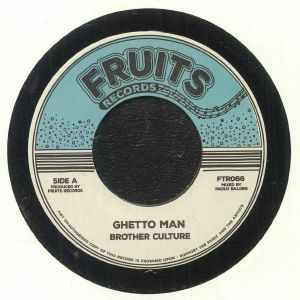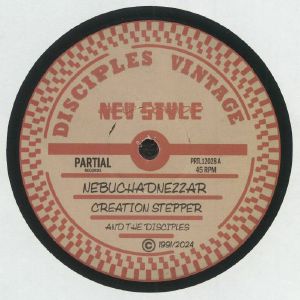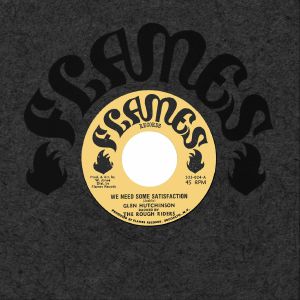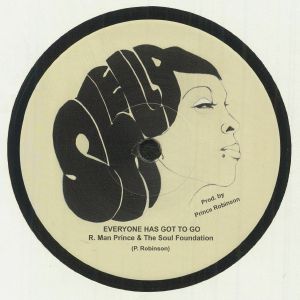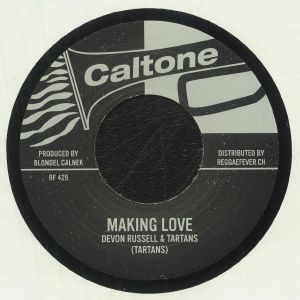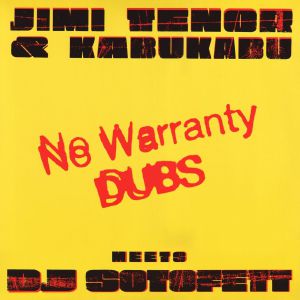Filter
Genre
在庫状況
Type
アーティスト
レーベル
Featured
リリースタイトル
値段
Back catalogue: Reggae
Juno's full catalogue of Reggae
シングル
Review: After racking up millions of streams for hits like 'Jump Up Pon It' and 'Heal Them', Brother Culture is now a reggae and dub icon having been a key figure in the UK scene for decades. His powerful voice and conscious lyrics have earned him a deserving global recognition and now he teams up with Swiss reggae masters The 18th Parallel for 'Ghetto Man,' a hard-hitting anthem of resilience and justice. Their deep roots sound, combined with Brother Culture's commanding delivery, makes for an electrifying track and on the flip, Paolo Baldini DubFiles adds his signature dub touch, making this a sound system anthem that speaks to struggles and strength worldwide.
… Read more in stock $13.25
Nebuchadnezzar (B-STOCK) (12")
Cat: PRTL 12028 (B-STOCK). Rel: 01 Jan 90
B-STOCK: Record slightly warped
Review: ***B-STOCK: Record slightly warped***
Timeless digital roots and dub from The Disciples here featuring the late Jamaican singer Creation Stepper, who i most famously well known for his iconic 70s roots reggae classics. This release includes a fresh take on Stepper's 1978 track, 'Kill Nebuchadnezzar' and it is paired with another vocal gem, 'Ozone Layer,' plus two powerful dub versions. Originally mixed and produced by Russ D in The Disciples' studio in 1991, this music finally saw the light of day in 2011 on the Disciples Vintage label where it quickly sold out. Now back on a great sounding 12", this is a must for roots and dub heads.
… Read moreTimeless digital roots and dub from The Disciples here featuring the late Jamaican singer Creation Stepper, who i most famously well known for his iconic 70s roots reggae classics. This release includes a fresh take on Stepper's 1978 track, 'Kill Nebuchadnezzar' and it is paired with another vocal gem, 'Ozone Layer,' plus two powerful dub versions. Originally mixed and produced by Russ D in The Disciples' studio in 1991, this music finally saw the light of day in 2011 on the Disciples Vintage label where it quickly sold out. Now back on a great sounding 12", this is a must for roots and dub heads.
in stock $13.82
Review: Originally released in 1979, this rare 45 from the American reggae artist now sees a well-deserved reissue, bringing classic roots and lovers rock reggae back to its intended format. On Side-A, 'We Need Some Satisfaction' delivers a dynamic horn section, a classy reggae groove and strong, soulful vocals that truly is killer. The track strikes a perfect balance between rhythm and melody, exuding the smooth vibe of late '70s reggae. On Side-B, 'Dub Music' takes us into deep dub territory, with a mostly instrumental arrangement, peppered with vocal snippets to keep the connection to the original track. The deep roller bass and atmospheric layers create a deeper listening experience for dub enthusiasts.
… Read more in stock $16.02
Cat: SR 012. Rel: 03 Apr 25
Review: 'Everyone Has Got to Go' is a powerful 1976 roots stepper by Jamaican-Canadian singer Prince Robinson aka R. Man Prince. Born in Rockfort, Kingston, Robinson auditioned at Studio One in his teens but didn't record until a decade later. After moving to New York and Canada, he returned to Kingston in 1976 to record two iconic roots anthems at Joe Gibbs studio: this one and the rare 'Funny Dream.' Joined by The Soul Foundation and top session musicians like Sly Dunbar and Robbie Shakespeare, the track's mix by Ernest Hookim and Barnabas features a haunting dub version.
… Read morePlayed by: Juno Recommends Reggae
in stock $16.02
Cat: RF 429. Rel: 02 Apr 25
Review: After a recent Pressure Sounds compilation put together the best of Caltone Records - documenting the truest gems of a great Jamaican dub label - the horse's mouth is now heard neighing. Caltone themselves have now reissued Devon Russell & The Tartans' 'Making Love', a long-lost from the late 1960s troubadours. Ne'er released before, it also comes backed exclusively with a bluesy Heptones, Tommy McCook & The Supersonics lamentation, 'Crying Over You'.
… Read morePlayed by: Juno Recommends Reggae
in stock $16.56
Cat: TIEU 040. Rel: 02 Apr 25
Review: Both tracks on this crucial new drop from Duke share a common theme of love and harmony, which were of course the cornerstones of reggae and part of the reason it has such an enduring appeal as the universal need for compassion and unity has never diminished. In fact, it might be more needed now than ever. First, 'Peace & Love' by U-Roy, The Jamaicans, and Tommy McCook & The Supersonics is a timeless cut with U-Roy's toasting sat next to horn-driven rhythms that were first released in the 1970s. Similarly, Tommy McCook & The Supersonics' "The World Needs Love" captures the essence of70s reggae, with McCook's smooth saxophone leading the instrumental arrangement.
… Read more in stock $15.20
アルバム
Lee PERRY presents THE JOLLY BROTHERS
Cat: SLLP 009. Rel: 16 Apr 25
Review: Here we have a welcome reissue of the Lee Perry-produced Conscious Man from The Jolly Brothers. Recorded in the late 70s but only released as an album in 1992, it shares its name with the standout title track, which became a massive hit when released as a single in 1977. The music still hits with that unmistakable Black Ark magic. Perry's production is loose, heady and live i tape hiss, endless reverb trails and all. The Jolly Brothers' harmonies are rough-edged but full of heart, delivering roots messages with an unmistakable mellow. 'Conscious Man' rightfully pulls focus, with its soulful vocals, phasing guitars and gorgeously lo-fi feel. It's dubby even in its vocal form. But there's plenty more to enjoy here, with a dusty optimism running through the whole record. As spiritually inclined as it is streetwise, it presents soul and roots in equal measure.
… Read more in stock $17.41
No Warranty Dubs (2xLP)
Cat: AMFIBIA 33. Rel: 28 Apr 25
Review: For the first time, experimental saxophonist and composer Jimi Tenor finds Norweigan dance powerhouse DJ Sotofett, both teaming up for a collaboration: 'No Warranty Dubs'. Completing the trifecta is Berlin ensemble Kabukabu, the five-piece Afro-jazz-funkers whose original recordings - many of which were overseen expertly by Tenor himself - now come redistilled through a dubwise filter paper. The loose-limbed, lackadaisical energy of Kabukabu's live instrumentation merge fully with Tenor's genre-blurring composites, as Sotofett recasts fifteen tracks into rhythm-driven, bass-heavy versions. The original free jazz and Afro-influenced elements remain present, but they here serve as rawer material for layered studio treatments, channelling echo-drenched edit work and hypnotic repetition, where nothing ever rests to the point of complacency.
… Read more in stock $21.83
Review: Mille Plateaux and Raster hero Andreas Tilliander meets Fire! Orchestra's Goran Kajfes somewhere deep - and we mean DEEP - in the jazz cosmos. The farthest reaches of a universe far, far away, but one that still seems to understand how joyful vast can sound when pierced by the haunting yet strangely alluring sound of brass. But simply defining this as jazz misses a point, then throws us well beyond the pale. In Cmin would be nothing without the electronic tricks and gadgetry that first made us feel as though we'd space-walked off the edge of the known galaxy, out past the Milky Way's stardust. Echoes, tape delays, things that add mood and timbre without necessarily shouting their presence. There's magic at work here. And, contrary to the 21st Century's obsession with under-the-hood, not knowing the how is the reason why you want this.
… Read morePlayed by: Alexis Le-Tan, Juno Recommends Ambient/Drone
in stock $25.96

 USD
USD





